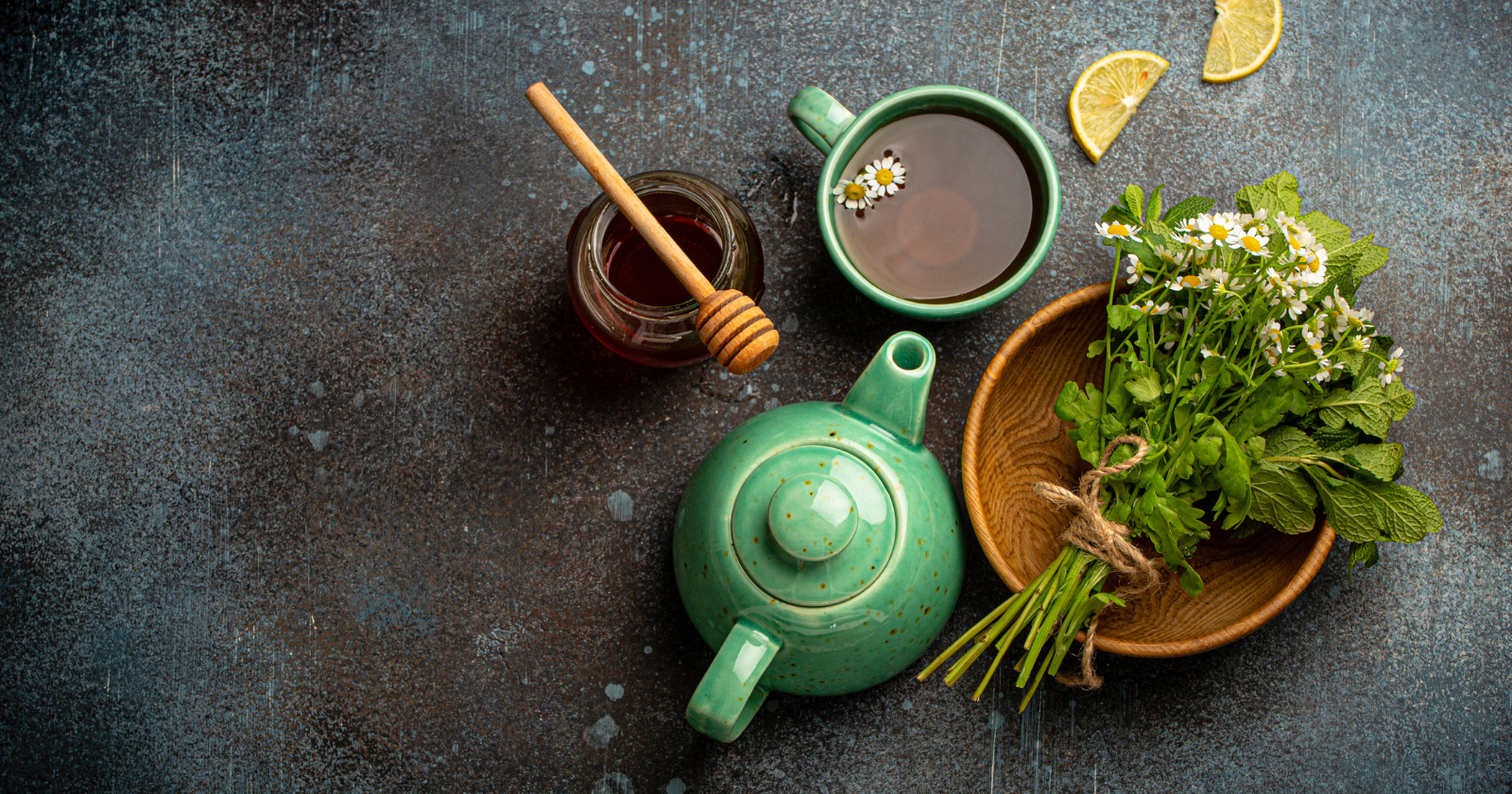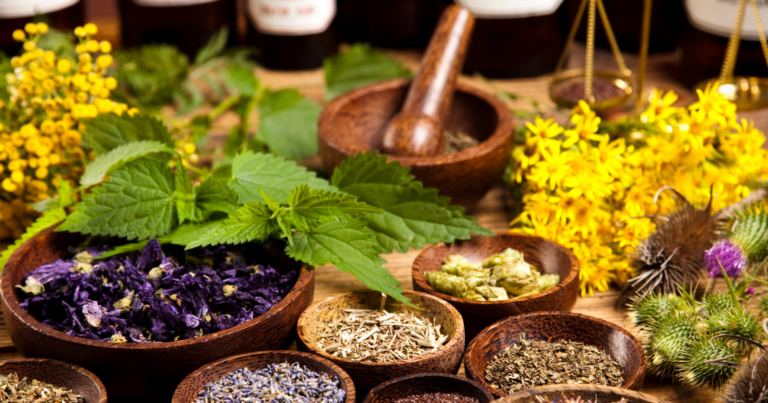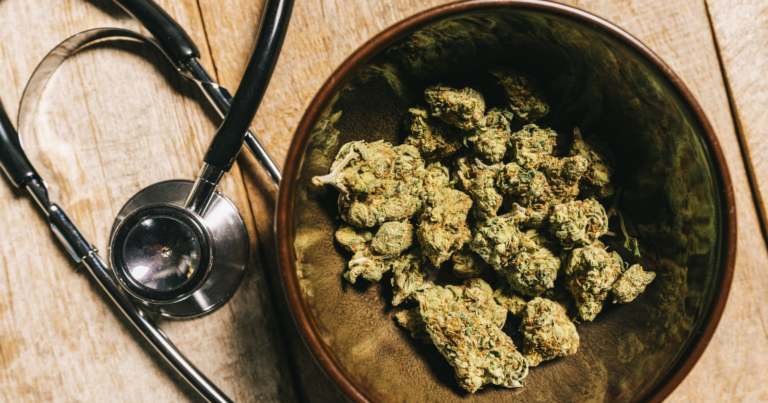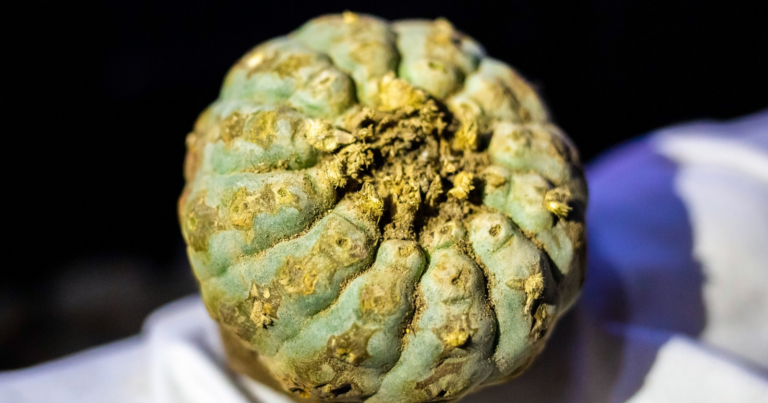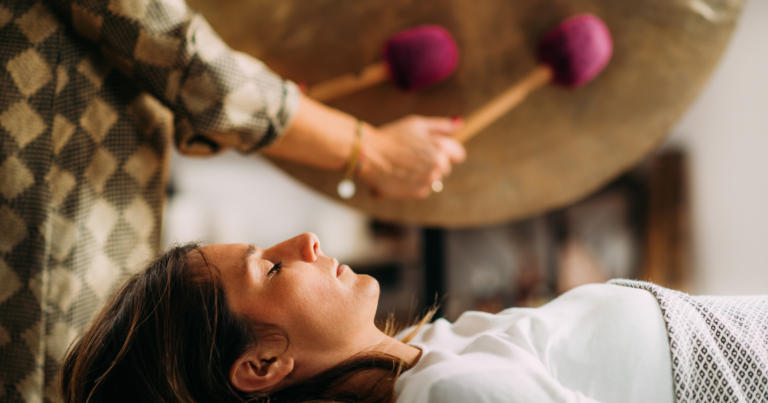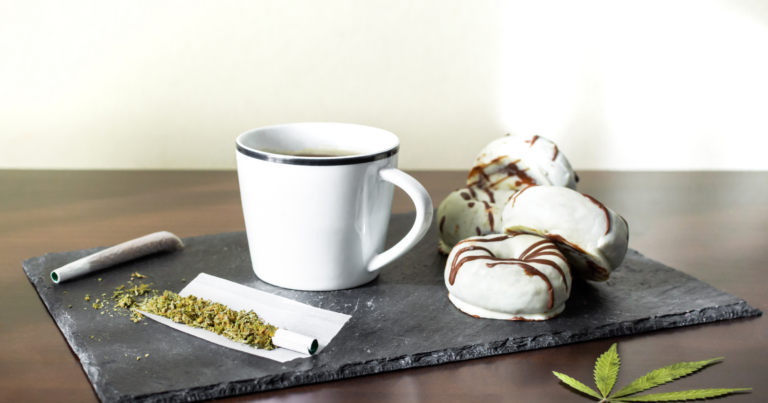If you’ve ever spent a sleepless night tossing and turning or felt the tension of a stressful day weighing on your shoulders, you’ve probably wished for a simple, natural way to relax.
That’s where herbal teas come in.
Just like a warm hug, a steaming cup of carefully crafted herbal tea can bring comfort and calm. And the fun part?
You can make it yourself!
Below, I’ll share my tested recipes of herbal teas that can help you relax before bad. By the end of this, you’ll be your own herbal tea mixologist, ready to unwind at the end of a long day.
1) Chamomile Lavender Tea
Chamomile and lavender are two herbs that I find incredibly soothing.
The thing is that both possess a subtle, floral flavor that is perfect for a calming nighttime tea.
Chamomile, well-known for its sleep-inducing properties, contains an antioxidant called apigenin. This binds to certain receptors in your brain that may decrease anxiety and initiate sleep.
On the other hand, lavender is celebrated for its distinct aroma. The scent alone is enough to reduce heart rate and blood pressure, promoting a state of relaxation.
How to make it: Simply steep a handful of chamomile flowers and a few sprigs of lavender in boiling water for about 5 minutes. You can also add a teaspoon of honey for a touch of sweetness.
Not only does this blend taste good, but it also provides a multisensory experience that engages both taste and smell.
2) Lemon Balm and Mint Tea
Next on my list is a refreshing blend of lemon balm and mint. This combination, while seemingly simple, has a profound impact on relaxation and sleep quality.
Lemon balm, a member of the mint family, is often used in aromatherapy for its mild sedative effects. It’s known to promote calmness and ease stress.
What’s more, lemon balm is rich in rosmarinic acid, a compound that has been linked with reducing symptoms of anxiety.
Mint, specifically peppermint, adds an invigorating twist to this herbal blend.
Beyond its vibrant flavor, peppermint contains menthol which is a natural muscle relaxant.
This physical relaxation can translate into mental relaxation as well, assisting in quicker sleep onset.
How to make it: Steep a handful of fresh lemon balm leaves and a few sprigs of mint in boiling water for about 10 minutes. I sometimes add a slice of fresh lemon for an extra zesty kick.
This blend is a personal favorite of mine for its dual action – it calms the mind while simultaneously invigorating the senses.
3) Valerian Root and Hops Tea
And now, for something a little different, let’s explore a blend of valerian root and hops. Yes, you heard that right!
Hops aren’t just for beer brewing – they have a place in your bedtime routine too!
Valerian root is often referred to as “nature’s Valium” due to its sedative properties. It increases levels of a chemical called gamma aminobutyric acid (GABA) in the brain, which can reduce nerve activity and promote sleep.
Meanwhile, hops, much like their brewing buddy barley, have sedative properties of their own.
Studies suggest that they can increase sleep time and decrease night-time awakenings.
If you’re feeling adventurous, this tea is worth a try.
How to make it: Steep a teaspoon of dried valerian root and a few hops flowers in boiling water for about 10 minutes. Be warned, though — valerian has a strong earthy flavor that’s not everyone’s cup of tea.
But if you’re someone who struggles with sleep or anxiety, this potent blend could be just what you need to ease into a restful slumber.
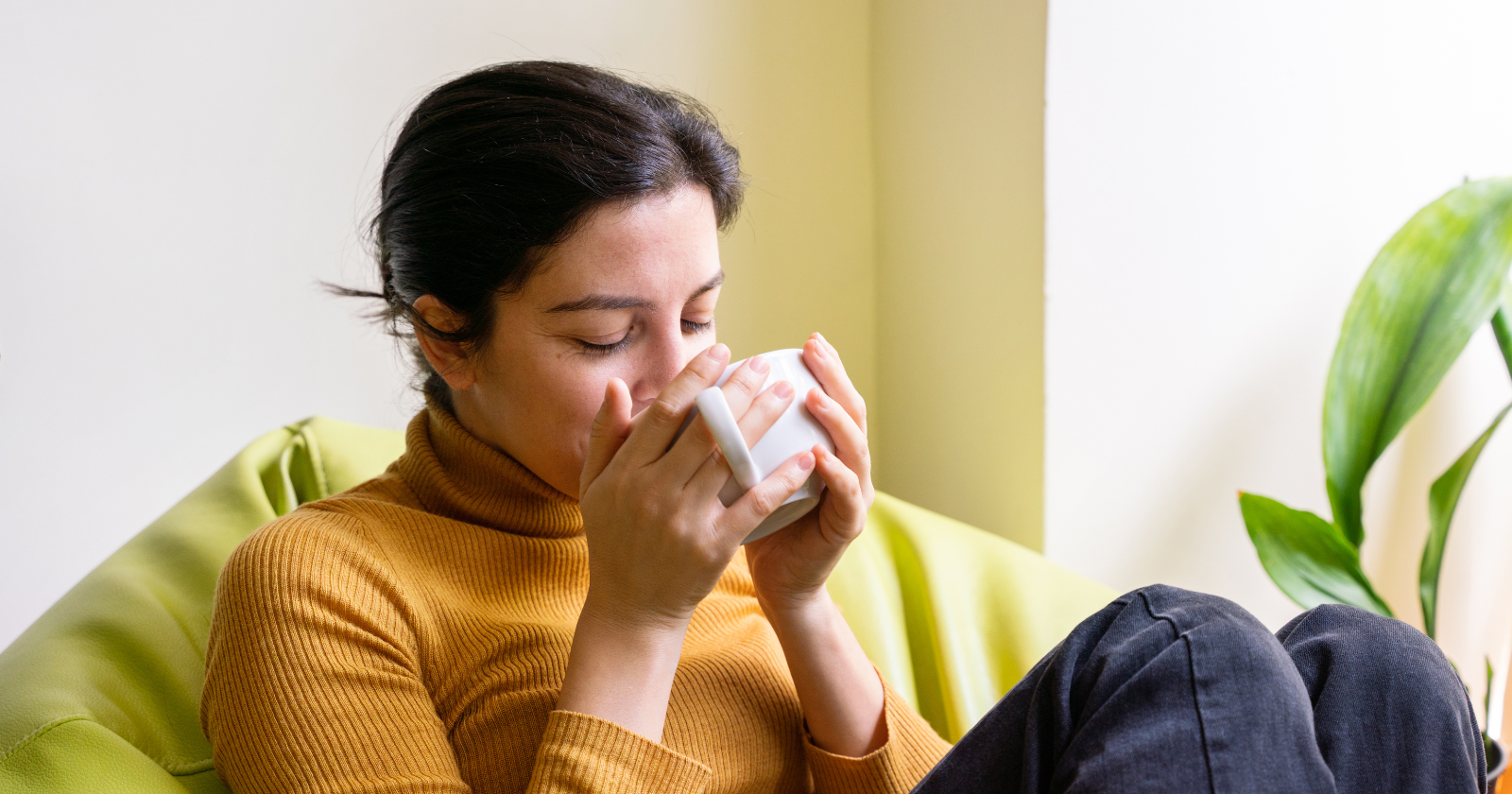
4) Passionflower Tea
Have you ever considered passionflower as a bedtime companion?
This vibrant flower, native to the Americas, has a long history of use in herbal medicine for its calming effects.
Passionflower is rich in flavonoids and alkaloids, compounds that interact with the GABA receptors in your brain – much like valerian root.
This interaction helps reduce anxiety, ultimately aiding sleep.
Now, you might be wondering how to make passionflower tea.
It’s quite simple:
Steep a teaspoon of dried passionflower leaves in boiling water for about 10 minutes. The resulting infusion has a pleasant, grassy taste that I personally find quite soothing.
For those nights when anxiety or stress are keeping you awake, a warm cup of passionflower tea might be just the ticket to tranquility.
5) Tulsi and Ashwagandha Tea
Another interesting duo that I’ve discovered in my exploration of sleep-inducing teas is tulsi and ashwagandha.
These two herbs are staples in Ayurvedic medicine, known for their adaptogenic properties.
Simply put, adaptogens help your body manage stress. They boost your resilience, helping you cope better with physical and emotional strain.
Now, regarding our two heroes:
- Tulsi, also known as holy basil, is believed to balance different bodily processes and promote relaxation.
- Ashwagandha, on the other hand, is renowned for its ability to reduce cortisol levels, the body’s primary stress hormone.
How to prepare this blend: Steep a teaspoon each of dried tulsi leaves and ashwagandha root in boiling water for about 10 minutes. The flavor profile is earthy with a mild sweetness, a perfect soothing end to your day.
By combining these two powerful herbs into one evening brew, you’re not just promoting better sleep but also fortifying your body’s response to stress.
It’s holistic well-being in a cup.
6) Rooibos and Cinnamon Tea
Now, let’s talk about a combination that I find particularly comforting – rooibos and cinnamon.
The earthy sweetness of rooibos paired with the warmth of cinnamon creates a brew that feels like a gentle hug.
Rooibos, native to South Africa, is caffeine-free and packed with antioxidants. It’s known to promote heart health and may help lower bad cholesterol. But, for our purposes, it’s the lack of caffeine that makes it an ideal choice for a bedtime brew.
As for the cinnamon, it does more than just add flavor. Cinnamon has been found to have calming effects on the brain and could help induce feelings of coziness and warmth.
Creating this tea is straightforward: Steep a teaspoon of rooibos leaves and a stick of cinnamon in boiling water for about 5 minutes. The resulting brew is a deep red infusion with a naturally sweet flavor.
7) Ginger and Turmeric Tea
Imagine a chilly evening, you’re wrapped up in a cozy blanket, and in your hands, you’re holding a warm mug of ginger and turmeric tea.
Sounds comforting, doesn’t it?
This duo is not just warming and flavorful but also packs a powerful health punch. Both ginger and turmeric are renowned for their anti-inflammatory properties and are loaded with antioxidants.
Ginger has a long history of use for relieving digestive problems such as nausea, loss of appetite, motion sickness, and pain. While its spicy flavor is invigorating, it also has a calming effect on the body and can help prepare you for restful sleep.
Turmeric, on the other hand, contains curcumin which has been linked to various health benefits like boosting brain health and aiding in depression.
How to make this tea: steep a small piece of ginger root and a teaspoon of ground turmeric in boiling water for about 10 minutes. I like to add a splash of almond milk and a dash of black pepper to boost the absorption of curcumin.
When you’re feeling under the weather or just in need of some warmth and comfort, this hearty blend can be your go-to. It’s like a comforting hug in a mug.
8) Fennel and Orange Peel Tea
The final blend I’d like to introduce to you is a combination of fennel seeds and orange peel.
I know this might sound unusual, but trust me: it’s a game changer when it comes to promoting restful sleep.
Fennel has been used in traditional medicine for its calming effects on the digestive tract. It’s rich in melatonin, the hormone that regulates our sleep-wake cycle.
Consuming fennel before bedtime can help you fall asleep faster and wake up feeling more refreshed.
And when it comes to orange peel, it adds a delightful zing to the blend. After all, orange is packed with flavonoids and other compounds that have been linked to reduced levels of stress and anxiety.
How to prepare this tea: steep a teaspoon of fennel seeds and a few strips of dried orange peel in boiling water for about 10 minutes.
The result is a subtly sweet and slightly spicy brew that is sure to delight your senses while preparing your body for sleep.
Wrapping up your journey to relaxation
Okay, so you’re armed with 10 easy DIY herbal tea recipes — now what?
If you’ve been struggling with sleep issues, chances are, you’ve already tried quite a bit. Sleepless nights can be frustrating and draining, leaving you feeling like a shadow of yourself the next day.
But these herbal teas can help you take control of your well-being and harness the power of nature to support a good night’s sleep.
Still, remember: don’t expect immediate miracles from your herbal brews. Consistency is key here.
Drinking these calming teas before bed won’t magically fix all your sleep problems overnight. But they can certainly help create a peaceful bedtime routine and signal your body that it’s time to unwind and rest.


